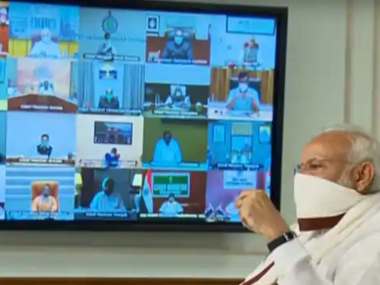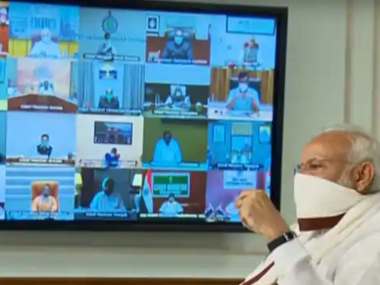On the eve of Republic Day in 2012, Narendra Modi (then the chief minister of Gujarat) ) wrote in his blogpost that “[i]t is high time the Centre realises that giving to the states what rightfully belongs to them will not weaken the Centre. The states must co-ordinate with the Union Government and not remain subservient to it. Co-operative and not coercive federalism must be the norm in our country.” Subsequently, these thoughts, that were fairly aligned with the constitutional vision, made their way into the BJP’s 2014 election manifesto. Among other things, the BJP pledged to “place Centre-State relations on an even keel through the process of consultation and strive for harmonious Centre-State relations.” Subsequently, upon assuming office, in his inaugural speech to the Rajya Sabha, Modi reiterated his belief in “cooperative federalism,” and the need to work with the states. However, it’s one thing to espouse majestic constitutional principles while in Opposition, and quite another to live up to them when in power. The manner in which the Central government under Modi has functioned underlines this fact. In six years of being in power, the present regime has systemically jolted the edifice of India’s federal architecture – be it via unilateral high-handed imposition of suspicious projects (such as demonetisation), or passing pivotal legislations involving the states’ interests (such as the Citizenship (Amendment) Act, 2019), or the handling of the COVID-19 situation — all of this without a sliver of consultation with the states. [caption id=“attachment_8376871” align=“alignleft” width=“380”]  Prime Minister Narendra Modi during a video conference with chief ministers. PTI[/caption] This article specifically illustrates how the battle against COVID-19 could have been fought better, and how the pandemic’s economic and social ramifications could have been mitigated in a more effective manner, had the Central government honoured its promise to abide by the spirit of cooperative federalism, and work with the states.
The deplorable tragedy of migrant labourers
The most tragic brunt of the haphazard imposition of the lockdown, is being borne by the migrant labourers. Since there was no legal framework specifically tailored to deal with a pandemic of this magnitude in India, the Central government invoked the Disaster Management Act, 2005 to impose the nationwide lockdown. Sections 11(1) and 11(2) of the Act mandates the drawing up of a “National Plan,” for the whole country “in consultation with the state Governments,” for disaster management. In a way, to this extent, the Act incorporates the essence of cooperative federalism. However, the Central Government neither drew up any plan, nor did it consult the State Governments before it imposed the lockdown. Thus, states had no time or manoeuvring room to work the logistics vis-à-vis the migrant labourers. As a result, the migrant labourers have ended up on the streets. Many of them are now unable to fend for themselves in their host states, and are finding it difficult to return to their native states as well. The world has been witnessing the gut-wrenching visuals of their travails on a daily basis.
One size does not fit all
The Seventh Schedule of the Constitution lists “public health,” as a state subject, and for good reason. As state governments are more aware of the needs of people within their jurisdictions, they are better equipped to handle a health crisis than the Centre. As we have seen, the coronavirus pandemic has affected different regions of the country to varying degrees. Thus, it would be counterproductive for the Centre to issue a top-down, homogeneous set of guidelines to states. For instance, while Kerala has succeeded in flattening the COVID-19 curve, cases in Maharashtra are still rising at a rapid rate. So, while Kerala may be ready for a gradual opening up of its economy, Maharashtra is far from it. Yet, last month, when Kerala decided to open restaurants, buses and private vehicles in specific zones, the Central government considered these steps as dilution of its guidelines, and discouraged the Kerala government from relaxing the restrictions. Such responses only serve to impede efficient functioning of the states. Likewise, when the Centre classified the entire country into district-wise zones, it drew flak from a few states. These states believed that an entire red-zoned district need not be placed under a stringent lockdown if cases were reported only from a small portion of that district. India’s fight against the pandemic would be far more efficient if the state governments are given the freedom to navigate in their constitutionally prescribed domains.
Indispensability of states’ financial independence
Several days before the Centre imposed a nationwide lockdown, when the magnitude of the pandemic was still unclear, several states invoked the Epidemic Diseases Act, 1897, and had very early on, started taking limited measures to deal with the pandemic. While the states’ revenue stream has been drying up (on account of the ban of alcohol sale, fall in the real estate market, etc), states continue to be at the forefront of the war against the pandemic. This entails a big financial cost to state governments. Ideally, the Centre should empower states in their fight against the pandemic by enabling them to access funds. However, it is succumbing to its impulse of centralising funds. Three examples are illustrative of this command-and-control approach: First, Modi instituted the public charitable trust, the PM-CARES Fund, with him as its ex-officio chairman. While contributions made to the PM-CARES Fund qualify as CSR expenditure under Schedule VII of the Companies Act 2013, those made to “Chief Minister’s Relief Fund,” or “State Relief Fund for COVID-19,” would not. Second, the Centre has has not been prompt with paying GST arrears to states. There cannot be a better time than now for the Centre to honour its GST-related commitments. Third, the Central Government recently decided to suspend the operation of the Members of Parliament Local Area Development Scheme (MPLADS) for the next two financial years, and divert all its funds to the Consolidated Fund of India. Although the legality and the utility of the MPLADS is oft deliberated, its suspension at this juncture is utterly ill-conceived, as it strips the MP of his/her authority and capacity to provide localised and last-mile support, in a manner suitable to the peculiar needs of the constituency.
Structural imbalance of power
The Constitution empowers the Centre to ensure that the government of every state functions in accordance with the constitutional provisions, and if the government of the state cannot be carried on in that manner, the Constitution empowers the Centre to impose President’s Rule in that state. However, states do not have the corresponding power to check the Centre upon the latter’s failure to function in accordance with constitutional provisions. Therefore, despite states being independent constitutional functionaries, and not merely “appendages” of the Centre, the inherent structural imbalance of power allows the Centre to drift from the essence of “cooperative federalism,” and indulge in “coercive federalism,” with impunity.


)

)
)
)
)
)
)
)
)



